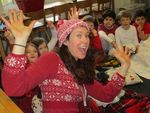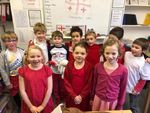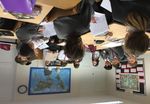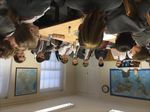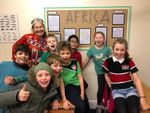The Skylark February 2020 - Heritage School
←
→
Page content transcription
If your browser does not render page correctly, please read the page content below
The Skylark
February 2020
Spring Term
Wonderful Encounters
Jason Fletcher
“The world will never starve for want of wonders,
but only for want of wonder.”
This comment by G.K. Chesterton captures
something of why education is, to me, so exciting.
There is, to put it simply, so much. And that ‘so
much’ is always there, silently extending its
invitation. The question is whether we will pause
long enough to notice.
I was telling our Infants and Juniors in assembly recently about the most amazing of birds. Each
weighs as much as an apple. Their delicate wingspan is about the length of my outstretched arm.
Generally nesting on beaches and off-shore islands farther north, some are known to breed as far
south as Blakeney Point in Norfolk. Both parents take turns incubating the eggs resting in a shallow
defile. Their young fledge (grow wing feathers enabling flight) after three or four weeks, and a month
or two later they fly the nest for good.
In the 1980s, some scientists decided they wanted to study their migration patterns and placed a
geolocator on a juvenile in Northumberland. One day it took off from the Farne Islands. I like to imagine
their astonished looks at one another when they realised it had made it to Melbourne, Australia in less
than two months, having flown over 14,000 miles! Just like that.
Subsequent studies have revealed these extraordinary birds often travel more than 40,000 miles in a
year on their journey to the Antarctic and back. Theirs is the longest known migration. Over their 20 to
30 year lifetime they travel hundreds of thousands of miles, like flying to the moon and back twice, and
then some.
We call these exquisite creatures Arctic terns (Sterna paradisaea), or swallows of the sea. You might
see them near nesting grounds in July in Northumberland or Scotland. Right now, they are enjoying
the Antarctic summer, but in April or May some might travel through Cambridge on their way north.
What incredible strength in so small a frame. What
incredible intelligence, finding their way there and
back again. What incredible efficiency, taking so
little of the earth’s resources to fuel their graceful
traverse of the planet.
This is just one example in a million. It is one thing -
and very important too - to possess an extensive
factual grasp. It is another to notice the invitation,
the voice calling. Hearing it and pausing to wonder
is the beginning of knowledge. Such encounters
are, to me, the life-blood of education.The Skylark
February 2020
International Day Jeni Watkins & Jonathan Burden
We all look forward to International Day at Heritage
and this year did not disappoint. Our International
Tuck Shop remained a highlight as pupils were able
to try food from around the world.
Infants and Juniors gathered at the end of the day for
a special assembly to share what they had discovered
about the country they had been studying.
Lower Prep had learnt about Italy. They had made
some delicious looking pizzas as well as beautiful
Venetian masks and threaded pasta
necklaces. Upper Prep were studying South Africa
and enjoyed listening to and making music and
colourful flags. They also demonstrated keen
linguistic skills as they shared some Zulu words they
had been taught by Mr Hulett and some Afrikaans by
Mrs Cubitt. Year 2 were looking at Denmark and the
legacy of the Vikings! They shared a time of Hygee -
talking about the things we love most, while drinking
hot chocolate. They made Danish heart basket crafts
and baked their our own aeblesciver!
Year 3 learnt about Georgia and made some very
detailed maps showing the various landforms. They
made khachapuri - cheese stuffed bread and learnt
about the 4 languages spoken in Georgia. In Year 4,
the children were studying Germany. They made
some fantastic puppets inspired by the stories of
Hans Christian Anderson. Mrs Scarlata also baked a
delicious apple strudel which was quickly eaten. Year
5 learnt about life in Kenya and enjoyed a visit from
Mrs Davies who shared her experiences of the
country. Year 6 had focussed on Scotland and
engaged in a lively debate about the existence of the
Loch Ness Monster. They also put their creative skills
into action making clay models of ‘Nessie.’
In the Senior School, pupils were able to come to
school dressed either, in the colours of a flag or in the
traditional dress of a particular country. A collection
was made with proceeds being given to Street Child
United, a charity which reaches out to children
surviving on the streets, around the world. Many of
the lessons throughout the day were also given an
international twist.
To see more recent news, visit www.heritageschool.org.ukThe Skylark
February 2020
A Winter Walk Isobel Burden
Year 3 recently headed to the Cambridge Botanic
Garden as part of their weekly enrichment programme.
Armed with sketching pencils and clipboards they set
off for the beautiful Winter Garden, remembering on
their way, favourite plants and scenes from their last
visit. The Scented Garden is always a highlight and the
muntjac deer they hoped to see again did not let them
down!
The Winter Garden itself was simply stunning. Created
in 1979 with a marvellous array of different shades,
scents and textures, the site was sculpted to ensure that
low winter sun catches stems and intensifies colour
The spectacular red of the Siberian Dogwood captivated the
class, they couldn’t believe at first that it was a natural hue!
Other favourites were the peeling cinnamon-coloured bark of
the Paperbark Maple and the spectral, white stems of the
Japanese Wineberry. Pupils found their favourite position to
sit and sketch with friends.
They walked back with some wonderfully detailed drawings
as well as the memory of delightful displays to “flash upon that
inward eye, Which is the bliss of solitude”. (Wordsworth)
Tutankhamun - Treasures of the Golden Pharaoh Jean Carter
During the Christmas holidays, my family and I enjoyed a
wonderful day out in London at the Tutankhamun exhibition,
running at the Saatchi Gallery until May 2020.
Tutankhamun has a special association with our family, as the
Egyptologist, Howard Carter, is the cousin of my husband’s
grandfather. This is the last time artefacts from the tomb will
travel abroad as a new purpose built museum is being
constructed in Cairo. The exhibits are stunning and include
many items that have never left Egypt before. All are
beautifully preserved, stunning in the quantity of gold and
precious stones used and exquisitely detailed in
craftsmanship.
Heritage pupils study Ancient Egypt and the famous Egyptian pharaoh in Year 3 and we feel sure
that pupils of any age will find this amazing exhibition very interesting.
To see more recent news, visit www.heritageschool.org.ukThe Skylark
February 2020
The Harkness Method Elaine Cooper
Last term we began experimenting with a new approach in our Senior School. It is an educational tool
known as the Harkness Method, which we are planning to use periodically.
Harkness refers to a method of teaching that was developed in the 1930s at the Phillips Exeter School
in New Hampshire, USA. In a Harkness lesson learning takes place through a discussion held around
a circular “Harkness Table”. Sitting at the table, members of the class question and consider a topic
together. They are given work prior to the class so they can be thoroughly prepared. When they meet
for the lesson, the teacher takes a back seat, becoming a guide who only joins the discussion when
necessary. The pupils are responsible for the conversation.
The advantages are many: it puts the onus on the pupils to engage; it requires independence and
critical thinking; it emphasises collaboration and constructive discussion rather than point scoring. To
be successful in a Harkness lesson, pupils need to be good listeners and willing to take the risk of
offering a question or opinion. It encourages many of the intellectual and social skills we want to nurture
in our pupils.
Of the many arguments in favour of the method, the most important may be that it lifts learning above
a mere mechanistic transmission of information and invites the quality of engagement necessary for
deeper integration. We are encouraged by what the Harkness Method has to offer and look forward to
using it further here at Heritage.
New Addition to the Staff Team
Mrs Catherine Lawless, Administrator
‘I am very excited to have joined the lovely team here at
Heritage and I look forward to meeting you all in the coming
weeks. In my free time, I enjoy going for hikes with my
husband, our two young sons and (very bouncy) dogs. We
reached our first summit as a family, Thorpe Cloud in the
Peak District, last summer! I also love reading, baking and
crossword puzzles.’
To see more recent news, visit www.heritageschool.org.ukYou can also read




